Hugh Munro 73876776 DIPL403: Ethics and International Relations Research Paper
The Significance of Reparative Justice in the Context of Mass Atrocity:
By Hugh Munro
Reparations are often described as those measures which are taken to eliminate the moral dissonance that exists between perpetrator and victim after the former acts in a way that harms or violates the rights of the latter. The perpetrator of such an act is said to have an obligation to pay some form of reparation to the victim who has a corresponding entitlement to that reparation. But what about acts so atrocious that no amount of reparation could possibly make up for the loss suffered by the victims? Acts of torture and mass murder seem to create a moral gulf so deep that rather than being reparative, reparations can appear insulting or meaningless. My aim in this essay is to consider what meaning and significance programs of reparative justice can hope to aim for in situations which involve mass murder, torture, or any other atrocious act that can be deemed beyond the scope of full compensation.
I will start by discussing what constitutes a relevant relationship when considering reparative justice and suggest that the passage of time and state-continuity have a significant impact on perpetrator - victim based relationships. I will use arguments made by Thompson (2002), who suggests we must take an 'obligations-dependent' approach to reparative justice, and Waldron (1992), who emphasises the need to see justice as a prospective enterprise, to suggest that the relevant relationship is not strictly between perpetrator and victim. My next section will build on this assertion and argue that the relevant relationship in reparative considerations needs to be based on relations of respect between individuals in the present who have inherited an unjust past rather than on perpetrator-victim based...


